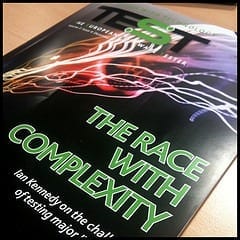
Just as the industrial age produced the laws of thermodynamics, we need universal laws of complexity to solve our seemingly intractable problems
As the world becomes increasingly complex and interconnected, some of our biggest challenges have begun to seem intractable. What should we do about uncertainty in the financial markets? How can we predict energy supply and demand? How will climate change play out? How do we cope with rapid urbanization? Our traditional approaches to these problems are often qualitative and disjointed and lead to unintended consequences. To bring scientific rigor to the challenges of our time, we need to develop a deeper understanding of complexity itself.
What does this mean? Complexity comes into play when there are many parts that can interact in many different ways so that the whole takes on a life of its own: it adapts and evolves in response to changing conditions. It can be prone to sudden and seemingly unpredictable changes—a market crash is the classic example. One or more trends can reinforce other trends in a “positive feedback loop” until things swiftly spiral out of control and cross a tipping point, beyond which behavior changes radically.
What makes a “complex system” so vexing is that its collective characteristics cannot easily be predicted from underlying components: the whole is greater than, and often significantly different from, the sum of its parts. A city is much more than its buildings and people. Our bodies are more than the totality of our cells. This quality, called emergent behavior, is characteristic of economies, financial markets, urban communities, companies, organisms, the Internet, galaxies and the health care system.
The digital revolution is driving much of the increasing complexity and pace of life we are now seeing, but this technology also presents an opportunity. The ubiquity of cell phones and electronic transactions, the increasing use of personal medical probes, and the concept of the electronically wired “smart city” are already providing us with enormous amounts of data. With new computational tools and techniques to digest vast, interrelated databases, researchers and practitioners in science, technology, business and government have begun to bring large-scale simulations and models to bear on questions formerly out of reach of quantitative analysis, such as how cooperation emerges in society, what conditions promote innovation, and how conflicts spread and grow.
The Latest Bing News on:
Big Data
- Big Data From Assembly Tools Raise Quality at Volvo Truckson April 26, 2024 at 6:15 am
Every time an assembler uses an electric fastening tool at the Volvo Group truck factory here, the data from the operation is logged and stored. Engineers are now using that data to increase quality.
- Big Dataon April 23, 2024 at 5:00 pm
With this acquisition, BMC continues to invest in innovation—from IT operations management to service management, data and application workflow automation, and mainframe management, according to the ...
- The Coolest Big Data Management And Integration Tool Companies Of The 2024 Big Data 100on April 23, 2024 at 3:48 pm
Data management and data integration software is one of the most dynamic segments of the big data universe with hundreds of vendors providing software products for specific data management tasks or ...
- The Coolest Big Data System And Cloud Platform Companies Of The 2024 Big Data 100on April 23, 2024 at 7:41 am
And long-established software giants like Microsoft, Oracle and SAP provide foundational cloud systems, databases and other supporting software for big data initiatives, in addition to offering their ...
- Big data boosts wearable tech: New study enhances physical activity trackingon April 21, 2024 at 7:10 pm
Researchers utilized a large-scale unlabeled dataset from the U.K. Biobank to train deep-learning models for accurately monitoring physical activity through wearables, demonstrating enhanced accuracy ...
- The Key to Success: Harnessing the Power of Big Data for Business Growthon April 19, 2024 at 4:12 am
In today’s fast-paced and competitive business world, staying ahead of the curve is essential for success. And one way companies are doing just that is by harnessing the power of big data. From ...
- AI and Big Data: Why You May Not Want to Let Your SaaS Agreements Auto-Renew Anymoreon April 16, 2024 at 10:20 am
Recent years have seen a rapid change in the technology, economics and regulations driving the software industry, such as the rise of artificial intelligence (including generative AI, like ChatGPT), ...
- Big Data: Data Analytics for Business and Beyondon April 1, 2024 at 3:09 am
Video: Watch Professor Qiwei Yao discuss his course. In this modern information age, the broad availability of Big Data (i.e. data of unprecedented sizes and complexities) brings opportunities with ...
- Leveraging big data for strategic business decisionson March 31, 2024 at 5:00 pm
Organizations today heavily rely on big data to drive decision-making and strategize for the future, adapting to an ever-expanding array of data sources, both internal and external. This reliance ...
The Latest Google Headlines on:
Big Data
[google_news title=”” keyword=”Big Data” num_posts=”10″ blurb_length=”0″ show_thumb=”left”]
The Latest Bing News on:
Emergent behavior
- Federal review slams Redlands Unified’s failures to address sexual abuse complaints by studentson April 25, 2024 at 11:22 pm
U.S. Department of Education’s Office for Civil Rights found the district violated the federal Title IX law in its handling of abuse complaints.
- The AI ecosystem is complex and dynamic: Its regulation should acknowledge thaton April 25, 2024 at 3:30 pm
We cannot presume that existing regulatory efforts looking backwards are either sufficient or a substitute for this bigger and more complex endeavor, which necessarily must be forward-looking, for ...
- Study explores parents' struggle with children's avid eating behaviorson April 23, 2024 at 11:51 pm
Study investigates parental experiences and challenges in feeding preschoolers with avid eating behavior, highlighting strategies to foster healthy eating habits and prevent obesity.
- “Parenting Doesn’t Matter”? Tell Me Another One.on April 23, 2024 at 1:34 pm
Brooks makes a lot of points in his essay that I support. Like the assertion that “the parenting technique that truly matters is warmth and affection” and the argument that “you will make a lot of ...
- Silicon Valley roundabout has drivers in a spinon April 23, 2024 at 3:15 am
Accidents at intersection quadruple The United States are widely free from roundabout tyranny with only one for every 33,330 people. A good thing too because people passing by the city of Hollister, ...
- ‘It's Not Me, It's You’: Do You Ever Have A Right To Ghost Someone?on April 22, 2024 at 1:41 pm
While ghosting is looked down upon and unpopular among people, there are instances where it's absolutely necessary.
- The Devil Lost In Details: Tasmanian Devil Cancer Transmission Is NOT Slowingon April 21, 2024 at 6:19 am
The Tasmanian devil, Sarcophilus harrisii, is a small, very smelly and extremely loud marsupial that was formerly present all across Australia until they became extinct there around 3,500 years ago, ...
- Computer scientist William Wang receives prestigious early career technical achievement awardon April 16, 2024 at 10:18 am
As artificial intelligence continues to boom, scaling algorithms to ever-increasing data sets also becomes a bigger hurdle. Such is the case in the domain of natural language processing (NLP), or, the ...
- Fallout 4: All Main Story and Faction Questson April 15, 2024 at 10:09 pm
There's a ridiculous amount of content for Fallout 4 players to sink their teeth into, with over 50 main story missions and plenty of side quests.
- The Best Fallout 4 Companions, Rankedon April 14, 2024 at 7:45 am
Fallout 4 offers players the chance to travel with a companion. Of course, choosing one isn't easy, so we ranked the best ones!
The Latest Google Headlines on:
Emergent behavior
[google_news title=”” keyword=”emergent behavior” num_posts=”10″ blurb_length=”0″ show_thumb=”left”]










